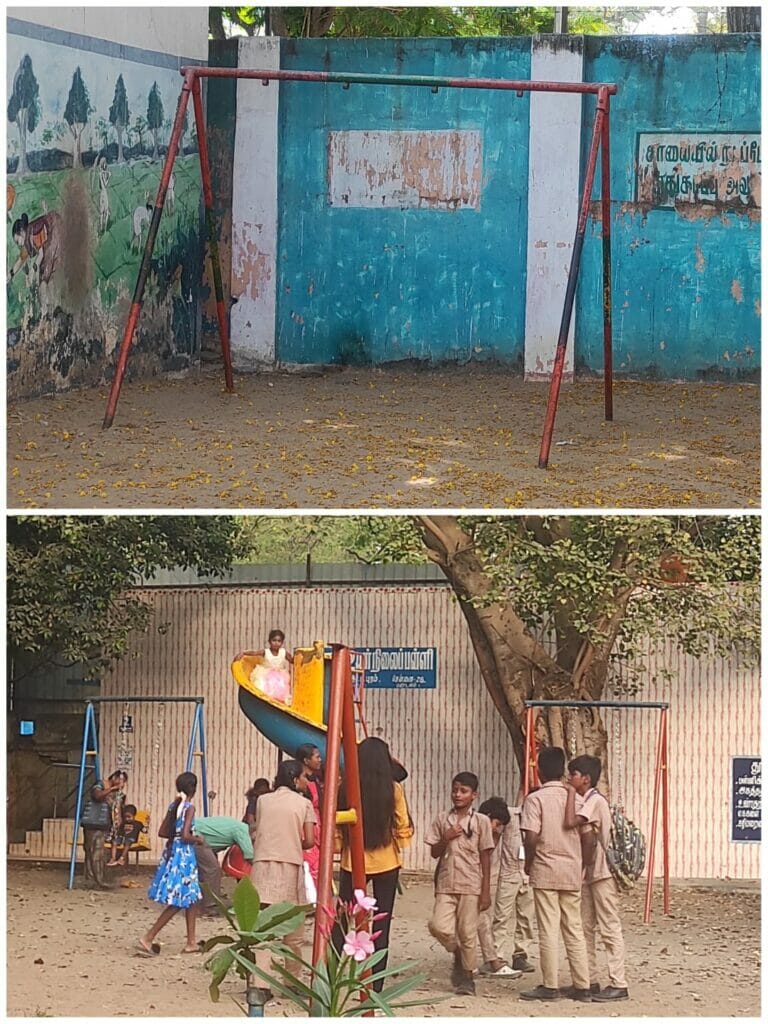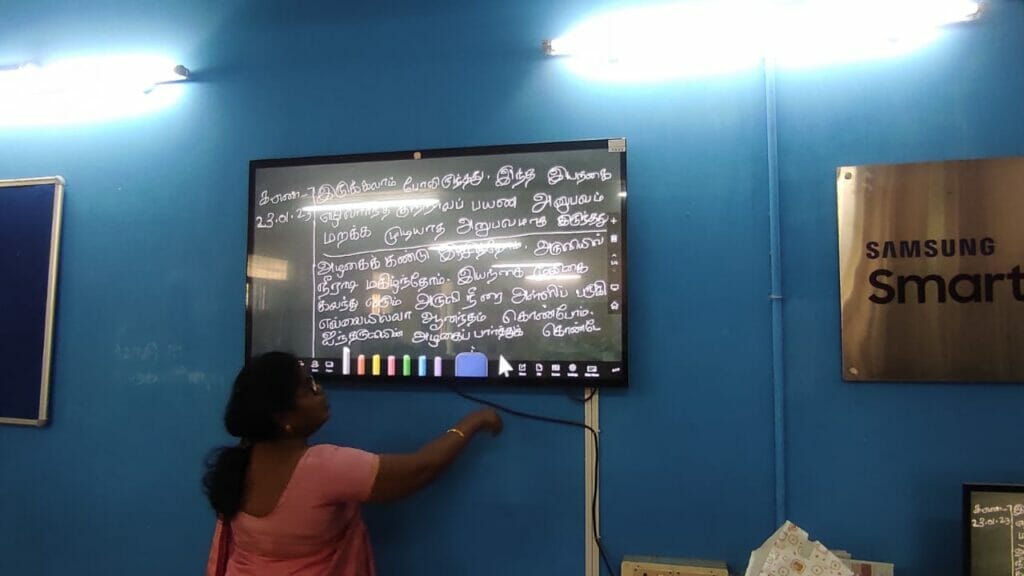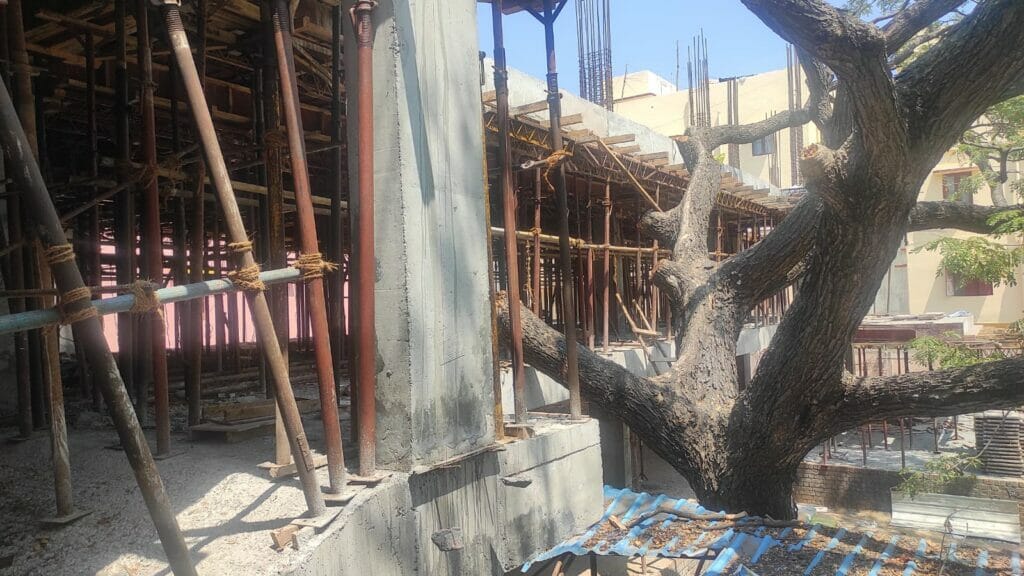Efforts have been made to create a positive perception of schools run by the Greater Chennai Corporation (GCC) with the aim of making the prospect of studying in these schools attractive. There has been an increase in enrollment in GCC-run schools in Chennai on the back of these moves and largely driven by the economic toll of COVID-19.
While there is a clamour for smart classrooms and the creation of model schools in the city, many GCC-run schools continue to function without basic infrastructure such as an adequate number of classrooms, working toilets and usable and safe playgrounds. Teachers in these schools find themselves performing multiple roles due to a shortage of staff. These issues also force parents to save up to be able to transfer their children to private schools with hopes for a better future.
Read more: Greater Chennai Corporation budget places emphasis on schools and infrastructure
Shared classrooms an issue in GCC schools

Student enrollment in GCC schools saw a meteoric rise during the pandemic. Given that the student population rose from 90,394 in 2020-21 to 1,14,000 in 2021-22, schools require upgrades in terms of infrastructure and personnel.
A GCC primary school in Thiruvottiyur has two classrooms, two teachers and 86 students in classes 1, 2, 3 and 4. Each classroom has students from two classes attending at the same time.
A period unfolds with the teacher giving an activity to the students of one class so that they are able to teach the students of the other class.
The teacher does not get to complete their lesson plan every day as they have to manage and discipline two classes in the same room simultaneously.
Many schools across the city have more than one class conducted in the same room due to the lack of an adequate number of classrooms.
The GCC-run school in RA Puram is no exception. “Even the room of the headmistress of the school sees classes being held in,” notes Amirda Varshini, Ward 126 Councillor.
Similarly, the library of a GCC school in Tiruvanmiyur is being used as a classroom in order to accommodate all the students, notes a teacher at the school.
In another GCC school in Tondiarpet, LKG and UKG students sit in the same classroom.
During the pandemic, one of the rooms in the school was used to store television sets by the civic body. They are yet to clear the room, despite the officials being made aware of the lack of space.
“My kid is in UKG and she sits with some other class. When I ask her what she learnt in school, she shares about her conversations with her classmates more than her lessons,” says Raji, a parent of a child attending a GCC-run school in North Chennai. “I am thinking of moving her to a private school next year if my daughter’s class does not get a separate room.”
If the number of classrooms increases, then the civic body will also be required to hire more teachers.
Existing infrastructure in Chennai’s schools falls short
Almost every classroom visited by Citizen Matters has new desks bought from Tamil Nadu Small Industries Corporation Limited (TANSI). “As of now, 14,090 desks have been bought from TANSI for the schools. For the newly added schools, we will procure the tables soon,” says the DC Education, GCC.
But not all students have been able to use the new desks. In a middle school in Tiruvanmiyur, some students were found to be sitting on the floor.
“The new desks are not child-proof. They have sharp edges and the tables are too high for kindergarteners,” says Raji, adding that the children sit on the floor to avoid getting hurt.
Apart from tables and chairs, the lack of fans is also a major concern in some GCC schools.
“My son goes to school wearing a clean uniform. However, he comes back sweating, and his uniform also gets dirty,” says a parent of a child attending a GCC-run school.
Not all schools have usable and safe playfields and playgrounds as well. Many schools have broken play equipment and hard surfaces that pose danger of injuries. Schools that do not have adequate space for playgrounds take the students to the Corporation playground nearby for physical education and sports.

Another integral infrastructure in schools is toilets. Even though funds from the Nirbhaya and Singara Chennai 2.0 schemes have been used to make toilets user-friendly, there are some issues. Some school headmistresses say that the contractors have done a shoddy job and that the bathroom tiles do not remain in place for long.
“Due to unsanitary conditions of the toilets, my daughter avoids drinking water and takes leave during periods,” says Komala, a parent of a child attending the GCC school in RA Puram. The toilets in the school often do not have water supply and are not cleaned.
In the GCC school in Tiruvanmiyur, there are more than 2500 students but just six toilets for girls. As per the World Health Organisation standards, there should be one toilet for 25 girls and one female staff.
Some GCC schools have smart boards or LCD/LED screens with projectors, purchased using the respective MLA funds or CSR funds. “We are aiming for one smart class per school as of now,” says Sharanya Ari, the Deputy Commissioner (DC) of Education of GCC. “Every class could have the chance of using the smart board regularly then.”
In Tiruvanmiyur GCC school, there is only one smart board which is currently in use. “The strength is so high in our school that it is not logistically possible to bring every class to the room which has the smart board,” explains a teacher.
The school in RA Puram does not have a smart board in even one classroom. A parent from the school says that they hope the use of such technology could happen uniformly across schools.

Read more: What I learnt about Chennai schools in 2022
Shortage of personnel places burden on teachers
A headmistress of a GCC-run middle school in South Chennai says that there are no funds for clerical assistants. Administrative work such as data entry and sharing of forms or circulars among the staff is being done by teachers who have to take time away from the classroom.
“This puts a lot of pressure on us. Therefore, sometimes I am in a rush to complete portions or I become very strict to make my students listen in class,” comments a teacher from the school. “It would be very useful if GCC could allow us office assistants. We will focus on teaching and bring better results.”
The schools also do not have an adequate number of cleaning staff.
In Tiruvanmiyur, there are only six personnel to sweep and clean the building apart from cleaning the toilets. It is a huge school with four blocks. “I come to work at 7 am and leave at 7 pm. Even when classes are underway, I have to complete cleaning the building and also attending toilet-servicing when I get calls,” says a cleaning staff. Due to this, there is a delay in keeping toilets pristine. “Sometimes some children will also break taps or vandalise the toilets, which makes matters worse.
Efforts to bridge the gap
These issues have been recognised by the civic body which has looked to increase spending on infrastructure in recent years.
Greater Chennai Corporation’s budget estimate for education for 2022-23 was a total of Rs 25.84 crores.
Much of this has been allocated towards school infrastructure.
- Operations and Maintenance expenditure involves charges for furniture, fittings, office equipment and electrical installation among others.
- Administrative expenses include the amount spent on building rent, internet and telephone charges and stationery for schools, apart from other particulars.
| Year | Total expenditure by GCC’s Education department | Operations and Maintenance expenditure (infrastructure) | Administrative expenditure |
| 2020-21 | Rs. 12.71 crores | Rs. 5.42 crores | Rs. 1.40 crores |
| 2021-22 | Rs. 22.24 crores | Rs. 9.02 crores | Rs. 1.60 crores |
| 2022-23 | Rs. 25.84 crores (budget estimate) | Rs. 10.53 crores (budget estimate) | Rs. 1.63 crores (budget estimate) |
Other state and union government funds to bridge infrastructure gaps include:
- Singara Chennai 2.0 funds have also been used for revamping and constructing toilets and school buildings. As of January 2021, 22 schools were selected for facelift and renovation at a cost of Rs. 56.8 crores.
- Nirbhaya Project funds (under the Union Government) of Rs. 18.87 crores have been allotted to refurbish and build toilets under the ‘Safe toilets for GCC Schools with Girls’ scheme in 132 schools. Phase 1 of the scheme, covering 100 schools is complete, according to the DC Education. The projects under Phase 2 are ongoing.
- Rs. 4.65 crores of Nirbhaya Project funds have been earmarked for installing 636 CCTV cameras in 159 GCC schools. DC Education says that CCTV cameras have a capacity of storage of up to 15 days and every school will have around four to five cameras.
- Under the CITIIS (City Investments To Innovate, Integrate and Sustain), 28 schools have been handpicked to reform infrastructure, estimated at a cost of Rs. 95.25 crores. The project aims to bring about improvement in six transformative areas, including technological advancement and teacher training among others. The project is funded by the Ministry of Housing and Urban Affairs (MoHUA), the Agence Française de Développement, the European Union and the Chennai Smart Cities Limited. The project is estimated to be completed by June 2023.
Apart from this GCC-run schools in Chennai have also seen donations and CSR funding from NGOs such as Bhumi and World Vision as well are corporate entities such as Torrent Gas. The funding has been used to revamp classrooms, build toilets and set up smart technology and provide computers among other equipment.
However, the progress on these efforts has not kept pace with demands from schools. There are also issues of parity in terms of providing facilities across all GCC-run schools in Chennai.
“Students can survive in schools without smart classes, but they cannot do without proper buildings, spacious classrooms, usable toilets and fans, apart from basic amenities,” notes Uma Maheshwari, a public school teacher.
“Efforts such as smart classrooms are eyewash initiatives. The government should focus on allocating more funds to hire more teachers,” says Uma.
Overworked teachers and poor infrastructure stand directly in the way of improving learning outcomes in GCC-run schools. With more students opting to join GCC-run schools, creating an ideal atmosphere by providing basic amenities will ensure the students can focus solely on getting a quality education.
